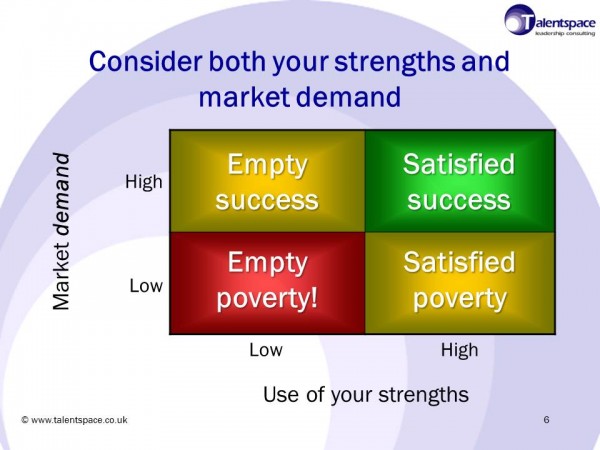Want your next job to be a happy, successful one?
I was running a workshop the other day for a group of job hunters (who had all recently been made redundant). Before helping them to hone their interview skills, I presented them with the following slide:

Before you jump into your job search, how about stepping back to think about what sort of job you should be doing next?
Will you be able to use your strengths?
On the bottom axis, we have the extent to which you will be able to use your strengths. When you look at a potential job, what proportion of your strengths will you be able to use on a day-to-day basis at work? Say you’re good with spreadsheets and enjoy using them. But a job won’t allow you to use spreadsheets at all – that would mean that your use of strengths for this job would be low.
If you get to use many of your strengths at work, you will feel satisfied. If you don’t get to use your strengths much, you will feel empty, bored or frustrated.
Are your skills in demand?
On the side axis, we have the extent to which a skill is either in demand (i.e. lots of employers want to pay for those skills) or not in demand. Obviously, if a skill is in demand, you will be able to make a good living out of it; if employers don’t want the skill, you won’t earn much out of it.
Clearly, you want to find a job that both allows you to use your skills and is in demand from employers. That puts you in the green ‘Satisfied success’ box.
No one wants to be in the red box. But many people end up in the two yellow boxes. For example, some artists, actors and singers end up in the ‘Satisfied poverty’ box out of choice. In order to pursue their passions, they would rather be happy and poor than richer but unhappy.
Avoiding that feeling of being trapped
I think the most common box in which people find themselves is the ‘Empty success’ box, where you do something because it pays well but you don’t really want to be doing it.
So before you start looking for your next job, step back and ponder: what do you actually want to be doing next?
And if you’re not sure what your next move should be, you might want to invest in a bit of reflection: have a go at writing a vision.


Leave a Reply
You must be logged in to post a comment.